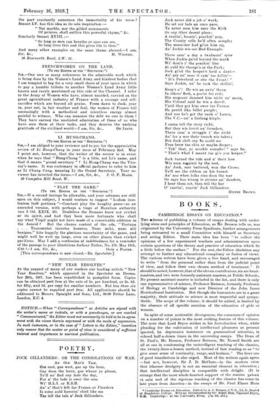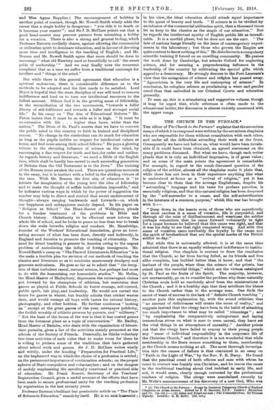BOOKS.
CAMBRIDGE ESSAYS ON EDUCATION.* THE scheme of publishing a volume of essays dealing with under- lying aims and principles of Education, as tin Benson tells us, was originated by the University Press Syndicate, further arrangements being entrusted to a small Committee with himself as Secretary and acting Editor. Their main idea has been " to collect the opinions of a few experienced teachers and administrators upon certain questions of the theory and practice of education which lie a little below the surface." For the rest, the Editor disclaims any attempt to further any educational conspiracy or fusion of views. The various writers have been given a free hand, and encouraged to write " from the personal rather than from the judicial point of view, and follow their own chosen method of treatment." It should be noted, however,that of the eleven contributors, six are head- masters, and two were formerly assistant-masters, at Public Scheele. No present assistant-master is included in the list, and there is only one representative of science, Professor Bateson, formerly Professor of Biology at Cambridge and now Director of the John Innes Horticultural Institution. But though the humanists are in a great majority, their attitude to science is most respectful and sympa- thetic. The scope of the volume, it should be added, is limited by the absence of all specific mention of the education of girls or women.
In spite of some noticeable divergences, the consensus of opinion on a number of points is the most striking feature of this volume. The note that Lord Bryce strikes in his Introduction when, while pleading for the cultivation of intellectual pleasures at present ignored, he deprecates insistence on grammatical minutiae, is echoed half-a-dozen times in the succeeding essays. The Dean of St. Paul's, Mr. Benson, Professor Bateson, Mr. Nowell Smith are all at one in condemning the unintelligent teaching of the classics, the twenty-lines-a-lesson method, instead of fast reading so as " to give some sense of continuity, range, and horizon." The freer use of good translations is also urged. Most of the writers again agree —but not, however, Sir J. D. McClure—in the modem view that irksome drudgery is not an essential element in education ; that intellectual discipline is compatible with delight. (It is strange that the most whole-hearted support of the maxim xriXer& rd Kcai and of the rigorous teaching of the classics has come in late years from America—in the essays of Mr. Paul Elmer More • Cambridge Essays on Education. Edited by A. C. Benson, C.V.O. LL.D.,Maatel of Magdalene College. With an Introduction by the Right HOD, VISCOUSH Bryce, O.K. Cambridge : at the University Press. Us. ed. net.I
and Miss Agnes Repplier.) The encouragement of hobbies is another point of contact, though Mr. Nowell Smith wisely adds the caveat that a single hobby is dangerous : " you ride it to death or it becomes your master" ; and Sir J. D. McClure points out that a good head-master may prevent parents from mistaking a hobby for a vocation. There is also a strong and general foaling, which Professor Bateson cordially shares, against allowing the commercial or utilitarian spirit to dominate education, and in favour of devoting more time and intelligence to the teaching of English ; and Mr. Benson and Mr. Nowell Smith agree that more should be done to encourage " what old Hawtrey used so beautifully to call ' the sweet pride of authorship.' " And we may finally note the recurrent complaint that as a race we suffer from a traditional contempt for intellect and " things of the mind."
But while there is this general agreement that education is a spiritual endeavour, there is considerable difference as to the methods to be adopted and the first needs to be satisfied. Lord Bryce is hopeful that the stern discipline of war will tend to remove indifference and lead us to turn our intellectual resources to the fullest amount. Others find it in the growing sense of fellowship, in the reconciliation of the two movements, "towards a fuller liberty of self-fulfilment and towards a fuller and stronger social life." In his essay on " The Aim of Educational Reform " Mr. Paton insists that it must be as wide as it is high. " It must be co-extensive with life . . . higher than lucre, wider than the nation." The Dean of St. Paul's asserts that we have to convert the public mind in this country to faith in trained and disciplined reason. " No change in the curriculum can do much for education as long as the pupils imbibe no respect for intellectual values at home, and find none among their school fellows." He pays a glowing tribute to the elevating influence of science on the mind, by encouraging a fine respect for truth and fact, for order and outline. As regards history and literature, " we need a Bible of the English race, which shall be hardly less sacred to each succeeding generation of Britons than the Old Testament is to the Jews." The training of the Reason must awaken the soul. There are querulous moments in the essay, but it is instinct with a belief in the abiding virtues of the race. With Mr. Benson the first aim of education is " to initiate the imagination of the young into the idea of fellowship and to make the thought of selfish individualism impossible," and he indicates various ways in which by the power of suggestion the teacher may help to direct and control that secret undercurrent of thought—always ranging backwards and forwards—on which our happiness and unhappiness mainly depend. In his paper on " Religion at School " the Head-Master of Wellington pleads for a franker treatment of the problems in Bible and Church history. Christianity to be effectual must inform the whole life of school, and he looks to peace no less than war to break down the walls betweim religion and conduct. Mr. Mansbridge, founder of the Workers' Educational Association, gives an inter- esting account of what has been done, directly and indirectly, in England and America to promote the teaohing of citizenship. The need for direct teaching is greater in America owing to the urgent problem of assimilating the influx of foreign immigrants. Mn Nowell Smith's essay on " The Place of Literature in Education " is in the main a forcible plea for revision of our methods of teaching the classics and literature so as to minimize unnecessary drudgery and generate enthusiasm. He goes so far as to admit that " the irrup- tion of that turbulent rascal, natural science, has perhaps had most to do with the humanising our humanistic studies." Mr. Malim, the Head-Master of Haileybury, deprecates the extravagant claims put forward by the champions of athletics, but maintains that games as played at Public Schools do foster courage, self-control, public spirit, fair play, and leadership. He would not curtail the hours for games in winter, but frankly admits that cricket wastes time, and would exempt all boys with tastes for natural history, photography, and other hobbies. He further condemns " looking on " except at the great games of the year, newspaper publicity, the foolish worship of athletic prowess by parents, and " millinery." " Not the least of the boons of the war is that it has ousted games from the foremost place as a topio of conversation." Mr. Badley, Head-Master of Bedales, who deals with the organization of leisure- time pursuits, gives a list of the activities mainly promoted at the schools of the Society of Friends. Personally, he thinks voluntary free-time activities of such value that to make room for them he is willing to jettieon some of the traditions that have gathered about &shoo] work and games. Sir J. D. McClure writes wisely and wittily, under the heading " Preparation for Practical Life," on the haphazard way in which the choice of a profession is settled; on the paramount importance of coiitinuation schools ; on the proper spheres of State compulsion and voluntaryism ; and on the dangers of unduly emphasizing the specifically vocational or practical side of education. Mr. Frank Roscoe, Secretary of the Teachers' Registration Council, gives a useful account of the efforts that have been made to secure professional unity for the teaching profession by registration in the last seventy years.
Professor Bateson's brilliant but pessimistic article on " The Place of Science in Education" stands by itself. He is no anti-humanist ; in his view, the ideal education should attach equal importance to the quest of beauty and truth. " If science is to be vivified by an infusion of the commercial utilitarian spirit, then a thousand times let us keep to the classics as the staple of our education." But he regards the intellectual apathy of English public life as ineradi- cable. It is a morbid phase, but he does not see the cure. " The fate of nations hangs literally on the issue of contemporary experi- ments in the laboratory ; but those who govern the Empire are quite content to know nothing of this:" He disbelieves in a compulsory scientific training if forced on an unwilling community. He praises the work done by Cambridge, but attacks Oxford for neglecting science, and for securing a preponderating influence in the leadership of the country by cultivating the special gifts which appeal to a democracy. Be strongly demurs to the Poet Laureate's view that the antagonism of science and religion has passed away. " Agnosticism is the very life and mainspring of science." In conclusion, he eulogizes science as proclaiming a wiser and gentler creed than that embodied in our Criminal Courts and education generally.
To sum up, this is a stimulating and suggestive volume, though it may be urged that, while reference is often made to the educational ladder, the discussion is almost entirely concerned with the upper rungs.



























 Previous page
Previous page